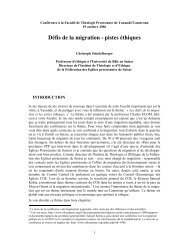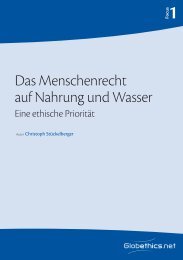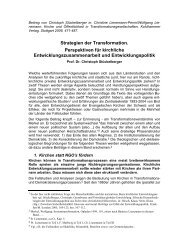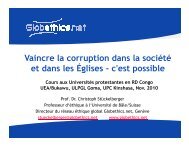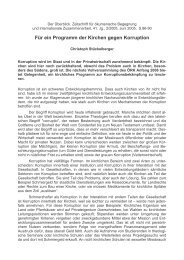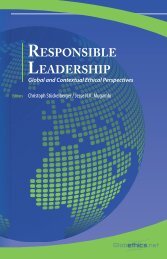BREAK THE CHAINS OF OPPRESION AND THE YOKE OF ...
BREAK THE CHAINS OF OPPRESION AND THE YOKE OF ...
BREAK THE CHAINS OF OPPRESION AND THE YOKE OF ...
You also want an ePaper? Increase the reach of your titles
YUMPU automatically turns print PDFs into web optimized ePapers that Google loves.
FuturE Reflection 3<br />
What are the threats humankind will face<br />
You could roughly draw out a map of the world and mark on it the<br />
threats you<br />
have identified.<br />
What are your initial reactions?<br />
What most alarms or surprises you?<br />
How urgent do you see these threats?<br />
If you made the collage, try to find some way of showing on it the threat<br />
of climate change.<br />
II Encountering the Word of God<br />
Theological approach<br />
The remainder of our report tackles the question of how these theological and<br />
scientific accounts bear upon each other as we work out a theological response to<br />
climate change. The approach we have adopted is to:<br />
● recognize the situation we find ourselves in, and the questions our faith provokes<br />
in this context;<br />
● bring these questions into dialogue with the Bible and Christian theological<br />
traditions; and<br />
● seek to discern the implications of this encounter for changed practice.<br />
Our report also seeks to reflect our practice as Christians, and is structured to reflect<br />
many Christian liturgies. We seek to bring the situation of the church, as part<br />
of a world facing threats of climate change, into encounter with God’s word in the<br />
Bible in order to �inform �and motivate � a response �by the �church<br />
and the world.<br />
Christian hope in the context of climate change<br />
We consider it crucial to begin our theological response to climate change by reflecting<br />
upon our situation in relation to the overarching biblical narrative: God<br />
creating the universe, God in Christ bringing reconciliation to a world gone<br />
astray (e.g. Gen. 3, 4, 6), and God’s promised redemption of all things in Christ<br />
and through the Spirit. 14 This understanding of the place in which the church<br />
finds itself crucially shapes theological thinking about climate change. First, and<br />
most importantly, followers of Christ must hope in these days and not despair. If<br />
we affirm the goodness of God’s creation, God’s incarnation in Jesus Christ, and<br />
God’s promise of redemption, we cannot despair of what will be, because we are<br />
called to have faith in God and hope in God’s promises. God’s creatures do not<br />
have the power ultimately to frustrate the purposes of the almighty God we wor-<br />
14 See paragraph ‘The Christian doctrine of creation’ above.<br />
������������������������������������������������<br />
� � � � ������������������������<br />
�<br />
152<br />
– Hope in God’s Future –



